AI PC race is getting fiercer! AMD launches a new AI chip for computers
AMD announced the launch of new AI chips for commercial laptops and desktops - the all-new Ryzen PRO 8040 series and Ryzen PRO 8000 series.
On Tuesday (April 16th), AMD announced the launch of new AI chips for commercial laptops and desktops - the all-new Ryzen PRO 8040 series and Ryzen PRO 8000 series.
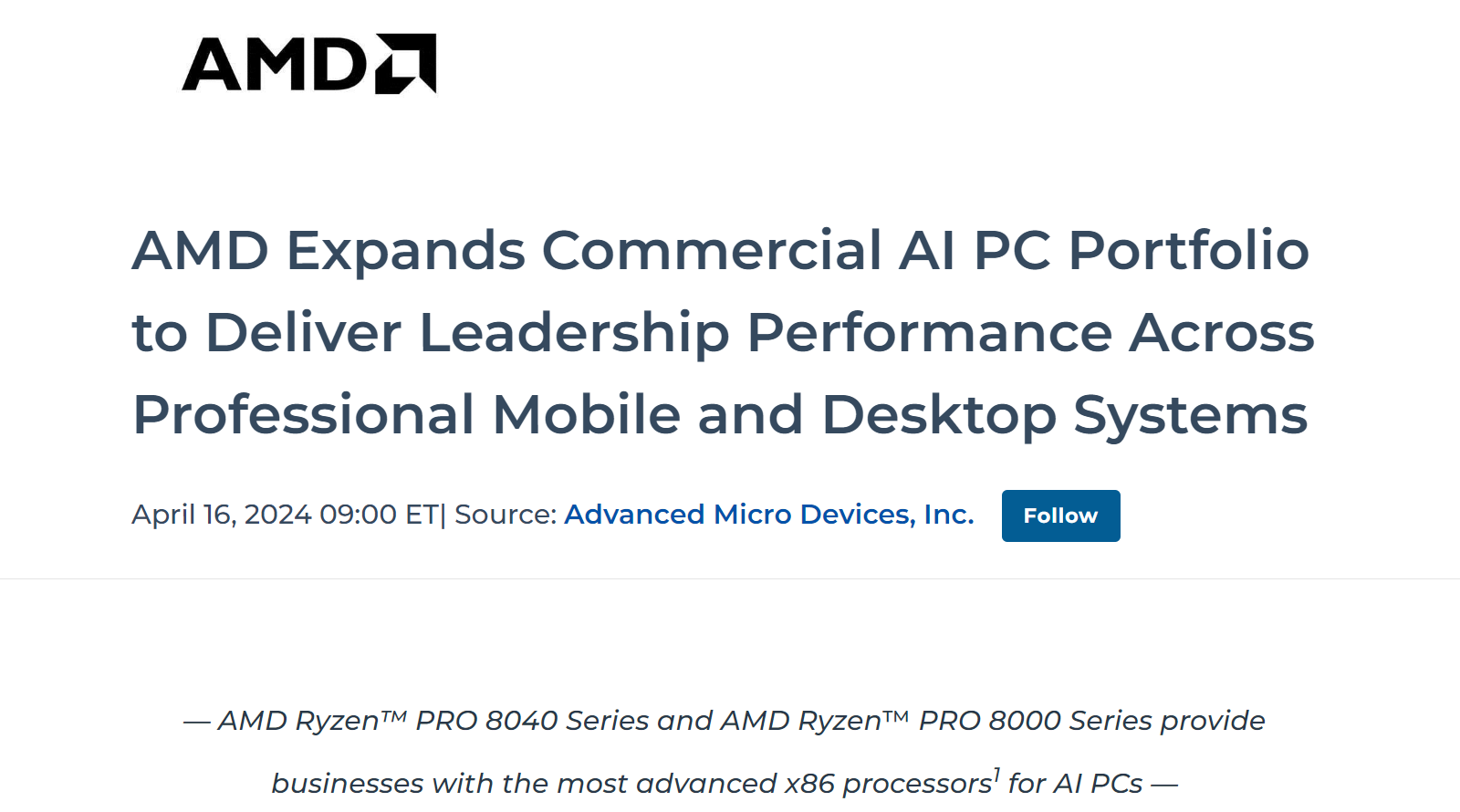
Officially, the all-new AMD Ryzen PRO 8040 series is an advanced x86 processor designed specifically for business laptops and mobile workstations. The Ryzen PRO 8000 series desktop processor is the first artificial intelligence desktop processor aimed at commercial users, aiming to provide cutting-edge performance with low power consumption.
The new Ryzen AI driver chip can provide more powerful dedicated AI processing capabilities than previous generations, with up to 16 dedicated NPUTOPS (trillions of operations per second) and up to 39 total system TOPS.
Commercial computers equipped with new Ryzen artificial intelligence chips will help change the user experience, providing next-generation performance for AI collaboration, content creation, and data and analytics workloads.
●Ryzen PRO 8040 series
The Ryzen PRO 8040 series has up to 8 high-performance cores, utilizing 4nm process technology and Zen4 CPU architecture, providing up to 30% comprehensive performance improvement for the most demanding mobile workstation applications.
AMD stated that with the help of specific models of AMD Ryzen AI and the powerful AMD RDNA3 graphics card integrated on the chip, compared to Intel Core, the Ryzen PRO 8040 series (with or without AI experience enabled) has improved video conferencing performance by up to 72% and reduced power consumption by 84%.
The most high-end Ryzen 9 Pro 8945HS in this series has 8 cores, 16 threads, 24MB cache, and Radeon 780M graphics card, which can handle high graphics requirements such as 3D rendering, video encoding, and photo editing workloads.
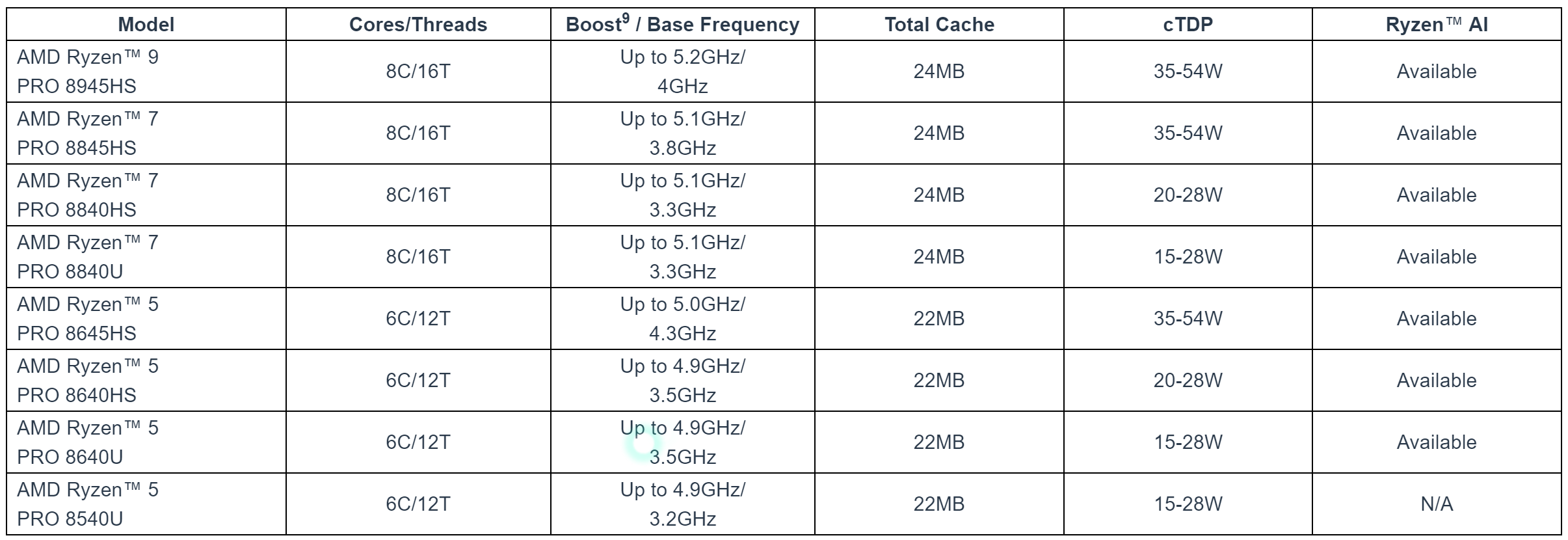
●Ryzen PRO 8000 series
Like the Ryzen PRO 8040 series, the 8000 series also has 8 high-performance cores and adopts 4nm process technology and Zen4 CPU architecture.
Compared to the Intel Core i7 14700 processor, commercial desktops equipped with the Ryzen 7 PRO 8700G processor showed a performance improvement of up to 47% in specific tests and a 3x increase in graphics performance.
Desktop computers equipped with Ryzen PRO 8000 series processors support DDR5 and PCIe 4, enabling lightning fast data transfer, making the workflow of the entire machine smoother, and accessing critical business applications and data faster.
The 8700G processor is the top of the line in this series, featuring 8 high-performance cores, 16 threads, 24MB cache, and an integrated AMD Radeon 780M graphics card. In competitive testing, the Ryzen 8700G achieved a performance improvement of up to 19% and lower power consumption, providing professionals with the performance required for each workload.
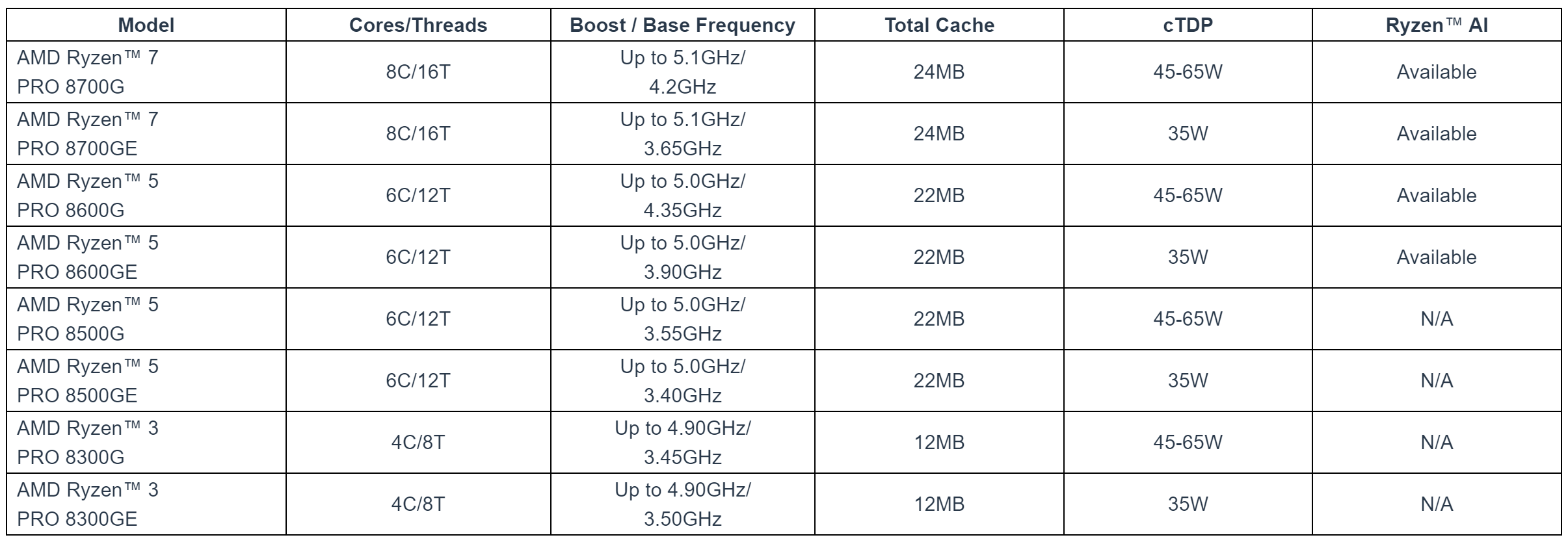
The two series of processors mentioned above are expected to be equipped on HP and Lenovo products starting in the second quarter of 2024.
“AMD delivers the broadest portfolio of AI technologies to address the needs of the modern business. As we continue to expand our AI PC leadership, we are bringing more power and efficiency to a wide array of desktops and mobile PCs,” said Jack Huynh, senior vice president and general manager, Computing and Graphics Group at AMD. “Our latest PRO series processors set a new standard for premium computing experiences and help businesses deploy AI capabilities across their PCs with leadership performance and security.”
Boosted by news of the release of new chips, AMD closed at $163.46 on Tuesday, up nearly 2%.
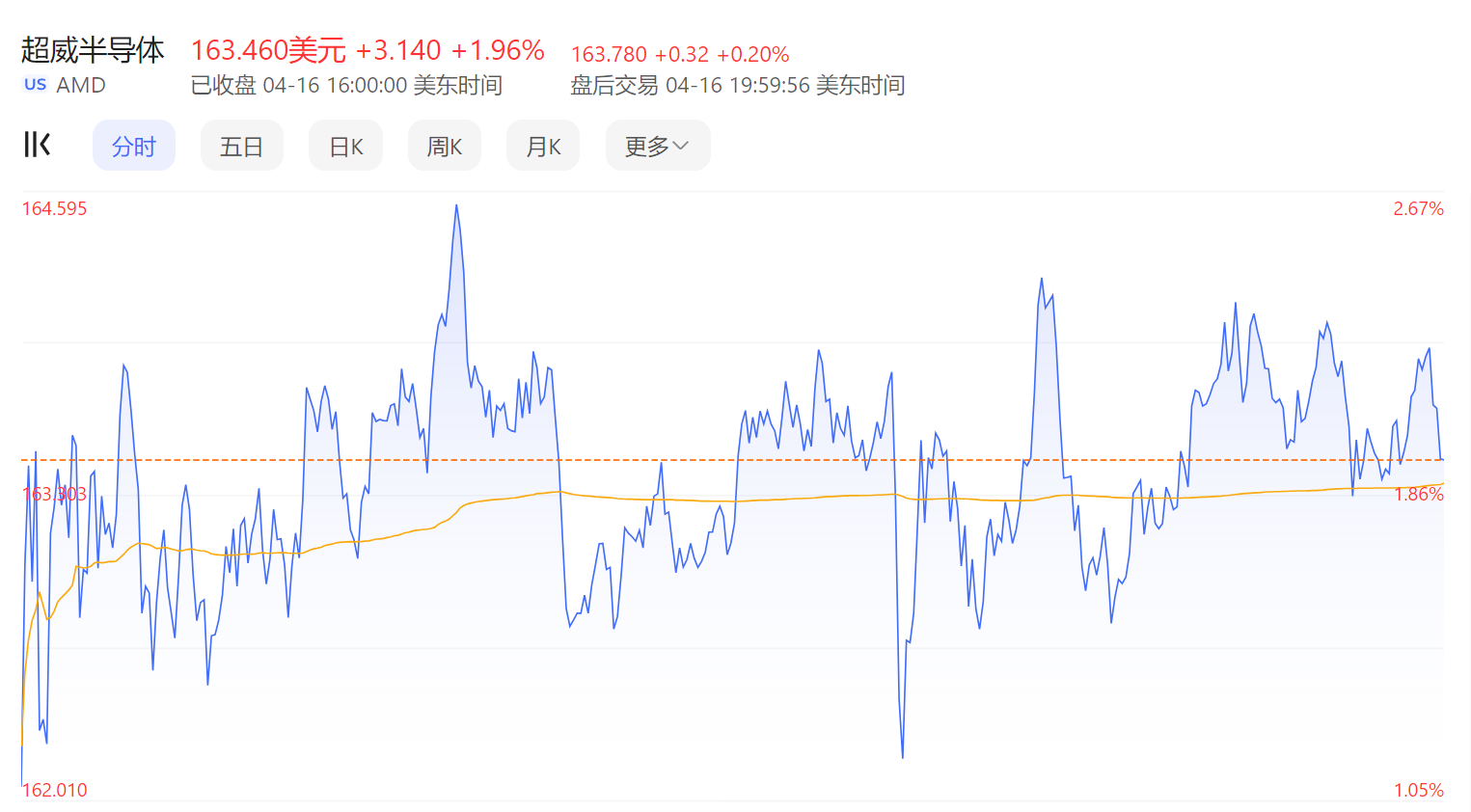
As AMD released its new chip, Evercore ISI analyst Mark Lipacis gave AMD a rating of "outperforming the market" with a target price of $200. This means that analysts believe that AMD still has over 20% room for growth.
Lipacis said in a report to clients, "We believe that AMD is a beneficiary of the structural shift from computing to parallel processing. Therefore, AMD should be able to gain more market share in server central processors and data center artificial intelligence accelerators."
The competition for AI PC has started
With the increasing popularity of AI, AI PCs (personal computers) have been seen by multiple traditional chip manufacturers as the next wave of growth and a battleground for them.
In February this year, AMD President Victor Peng stated in a media interview that "the AI PC market will continue to expand." He added that the company expects more AI PCs to be adopted in the second half of this year.
According to a report released by market research firm Canalys last year, the prosperity of generative AI is expected to drive PC sales as consumers seek devices with AI capabilities.
Canalys expects a significant increase in new AI supported models starting from the first half of 2024. By the fourth quarter of 2024, the shipment volume is expected to increase to around 20 million units, accounting for over 25% of the global PC market share.
Canalys stated that with the latest version of Windows expected to release artificial intelligence enhancements by the end of 2024, and the widespread integration of artificial intelligence tools in commercial and productivity software, the PC market that supports artificial intelligence is expected to achieve significant growth in 2025 and 2026. By 2027, it is expected that the shipment volume will exceed 175 million units, accounting for over 60% of the total PC shipment volume. From now until then, the industry will grow at a compound annual growth rate of 64%.
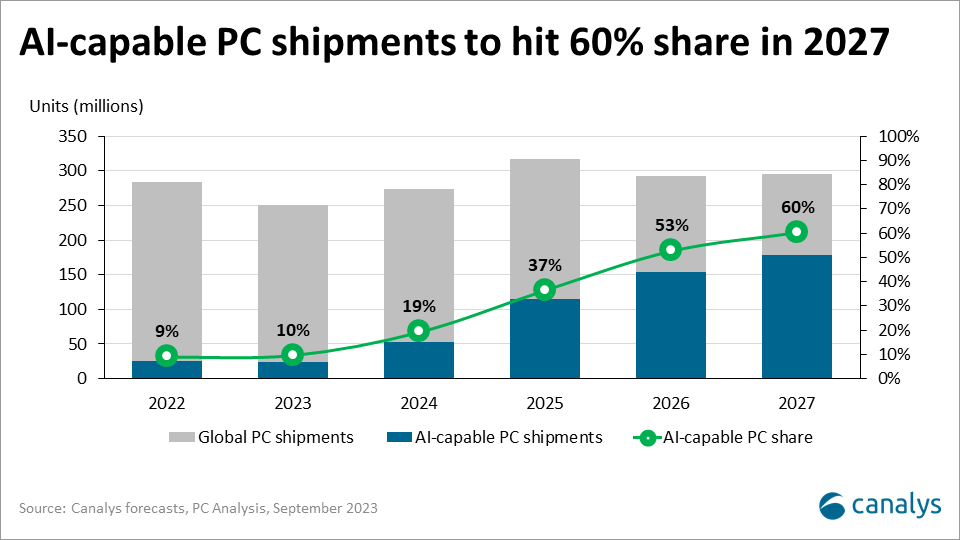
In this backdrop, major chip manufacturers are competing to launch more efficient and powerful artificial intelligence application chips.
Intel launched the Core Ultra chip in December last year, which can run artificial intelligence functions on PCs. The company stated that these processors will be embedded in over 230 of the world's first artificial intelligence PCs from companies such as Acer, Asus, Dell, HP, and Lenovo.
In early January of this year, Nvidia announced the launch of a new GPU for running generative AI applications on PCs. The company is expected to provide GPUs for laptops from companies such as Dell and Lenovo.
The new AI chips released by AMD will compete with chips designed specifically for AI PCs by Nvidia and Intel.
American consulting firm Gartner predicts that by 2024, the shipment of artificial intelligence PCs will account for 22% of all PCs. The research company predicts that by the end of 2024, the shipment volume of artificial intelligence PCs will reach 54.5 million units.
Gartner Senior Director Analyst Ranjit Atwal said, "The rapid adoption of GenAI functionality and AI processors on devices will ultimately become a standard requirement for technology suppliers." However, he also stated, "This universality will bring challenges for suppliers to differentiate themselves from competitors, making it more difficult for them to create unique selling points and increase revenue."
·Original
Disclaimer: The views in this article are from the original Creator and do not represent the views or position of Hawk Insight. The content of the article is for reference, communication and learning only, and does not constitute investment advice. If it involves copyright issues, please contact us for deletion.